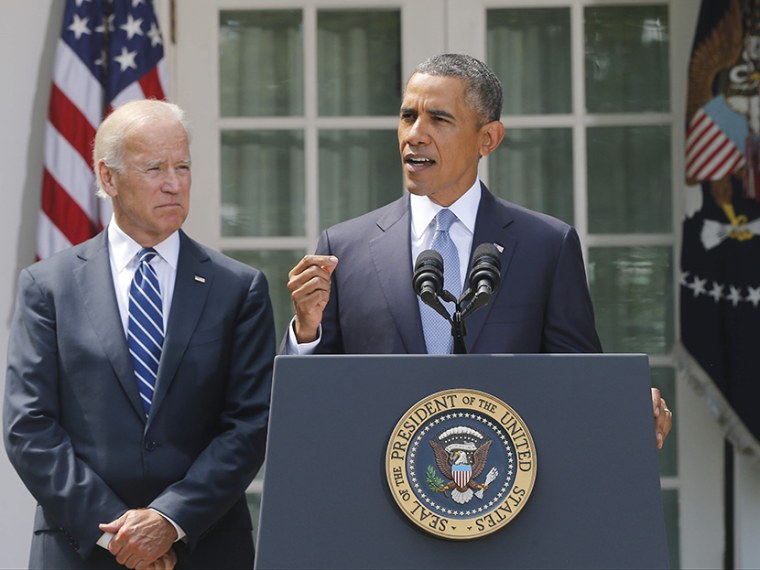A stroll around the White House grounds with his top adviser on Friday evening changed President Barack Obama’s mind about getting Congress to sign off on a military strike in Syria, senior White House officials told NBC News.
Obama had been leaning toward attacking Syria without a congressional vote for the past week, the officials said. Obama was convinced he had the evidence to back up a strike and as a result dispatched Secretary of State John Kerry to make a passionate case for U.S. action. But only hours after Kerry called Syrian President Bashar al-Assad "a thug and a murderer" and accused his regime of using chemical weapons to kill 1,429 people, Obama changed his mind as he walked across the South Lawn with Chief of Staff Denis McDonough, the officials said.
Returning from that walk, the president called his advisers in the early evening to inform them of his new decision.
The plan was immediately met with robust resistance from a whiplashed Obama team who had listened to Kerry lay out the administration's strongest case yet for action against Assad. "My friends, it matters here if nothing is done," Kerry had argued. "It matters if the world speaks out in condemnation and then nothing happens."
Obama's National Security Council had believed since last weekend that requiring a vote was not even on the table and that “consultation” in the form of congressional briefings and behind-the-scenes conversation was all that would be needed before a strike. One senior official noted that no key leaders in Congress had specifically requested a vote on military intervention.
Officials said that after the president met with national security advisers on Aug. 24, they determined the evidence showed Syria’s Assad regime had used chemical weapons in an attack earlier this month. At that time, the president indicated he was leaning toward a strike.
But a growing number of Congressional members were beginning to question the administration’s strategy by the end of the week. And an NBC News poll released Friday morning showed that nearly 80 percent of Americans agreed that the president should seek approval in advance of taking military action.
Officials said Obama also was influenced by Thursday’s lively debate in the House of Commons, where Prime Minister David Cameron lost a vote in Parliament to authorize participation in an allied strike against Syria. Cameron had been a staunch advocate of military action but was chastened in the wake of the vote. “It is clear to me that the British Parliament, reflecting the views of the British people, does not want to see British military action,” Cameron said. “I get that, and the government will act accordingly.”
While Obama's advisers argued Friday night in private that the humiliating defeat for Cameron starkly illustrated the risks of asking for congressional input, the president responded that the vote in Parliament demonstrated exactly why he should seek a vote on this side of the Atlantic, senior officials told NBC News.
Reaction from Congress was mostly positive in the hours after Obama detailed his position. A statement from House Speaker John Boehner other GOP leaders stated: “We are glad the president is seeking authorization for any military action in Syria in response to serious, substantive questions being raised” and noted Congress would begin debate when they return to Washington. And House Democratic leader Nancy Pelosi said, "President Obama is right that the debate and authorization by Congress for action will make our country and the response in Syria stronger.”
But a key group of Syrian rebels who have been fighting the Assad regime reacted in surprise and anger to the decision.
"The death will continue in Syria because of the (failure of the) leadership of the United States to act decisively at this point," said Louay Safi, a spokesman for the Syrian National Council. "Obama had the moral responsibility (to) act and not waiver."
This article originally appeared on NBCnews.com. For more on Syria, click here.
